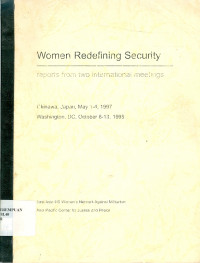
Text
Women redefining security: reports from two international meetings Okinawa, Japan may 1-4, 1997 Washington, DC, october 8-13, 1998
A review of the history of U.S. military bases in South Korea, Japan, and the Philippines is necessary to provide context for a discussion of the legal agreements that currently govern U.S. military operations in each of the three countries. The U.S. government supports nearly 2,000 U.S. military bases and facilities located strategically around the globe.' The Pacific Command is part of this network and comprises an integrated system of bases, warships, planes, and submarines2 that link Hawaii, Micronesia, Japan, South Korea, the Philippines, and Australia? The three countries that are the subject of this article have hosted U.S. bases for many years. The United States has positioned bases across the Pacific and in Asia for the purpose of extending the reach of U.S. troops and weaponry into Asia and, more recently, into the Middle East. U.S. bases in the Philippines played a key role in U.S. interventions in the Boxer Rebellion (China) in 1900, and in Siberia during the Russian Civil War (1918-20).' Philippine bases were used "for clandestine supply drops to U.S.-backed right-wing rebels in Indonesia" (in 1958), and the U.S. naval force from the Philippines was deployed to the Bay of Bengal during the IndiaPakistan-Bangladesh War (1971).' Dozens of U.S. bases in Okinawa, mainland Japan, and the Philippines were used as forward bases during the Korean War and the Vietnam War.6 U.S. troops in East Asia are also deployed outside the region, as was the case in the Persian Gulf War.7 According to a U.S. Defense Department report, "Asian nations provided. access to ports, airfields, and maintenance facilities for personnel, ships and aircraft en route to the Mideast."8 The details of U.S. military operations in foreign countries are governed by Status of Forces Agreements (SOFAs). These agreements, discussed in Part IV, govern such issues as regulation of military personnel and of crime. Due to the inequality of bargaining power between the United States and host governments and their disregard for local communities, many SOFAs fail to adec.,iately address problems created by military presence in host communities.
Availability
| KP.2.000235 | KP.2 KIR w | My Library | Available |
Detail Information
- Series Title
-
-
- Call Number
-
KP.1 KIR w
- Publisher
- San Francisco : East Asia-US Women's Network againts Militarism., 1999
- Collation
-
67 hlm.; ilus; 30 cm
- Language
-
English
- ISBN/ISSN
-
-
- Classification
-
KP.1
- Content Type
-
-
- Media Type
-
-
- Carrier Type
-
-
- Edition
-
-
- Subject(s)
- Specific Detail Info
-
-
- Statement of Responsibility
-
-
Other version/related
No other version available
File Attachment
Comments
You must be logged in to post a comment
 Computer Science, Information & General Works
Computer Science, Information & General Works  Philosophy & Psychology
Philosophy & Psychology  Religion
Religion  Social Sciences
Social Sciences  Language
Language  Pure Science
Pure Science  Applied Sciences
Applied Sciences  Art & Recreation
Art & Recreation  Literature
Literature  History & Geography
History & Geography